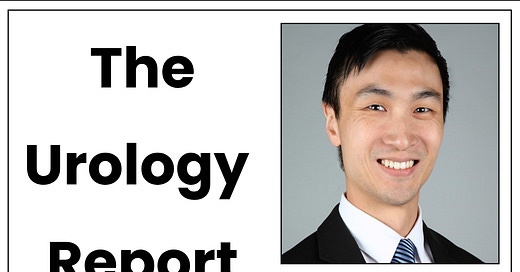(Editor’s notes:
(In this edition of The Active Surveillor, Kevin Shee, MD, of the University of California San Francisco, launches his new column to answer readers questions. Send your questions to howard.wolinsky@gmail.com Kevin joins The Active Surveillor’s panel of experts, including uropathologist, Ming Zhou, MD, of Mount Sinai in New York; abdominal radiologist, Antonio Westphalin, MD, of the University Washington, and lifestyle and diet expert, urologist Stacy Loeb, of NYU
(From time to time, I encounter an old friend. David Nash, MD, MBA, founding dean Jefferson College of Population Health, Thomas Jefferson University, Philadelphia, is the latest to join our exclusive club of patients on Active Surveillance for low risk prostate cancer. I met David back in mid-1980s when he was deputy editor and later chief editor of the prestigious Annals of Internal Medicine. I freelanced some articles for him; some of my best work.
We reunited recently when he got on the Active Surveillance train, and he subscribed to this newsletter. In his blog in MedPageToday he mentioned this Substack newsletter, which he described as being a support group. I hadn’t thought of it that way before, but he nailed it. One of my goals has been to make The Active Surveillor a community where we can learn from each other. I introduced him to the AnCan virtual support group forAS and the webinars I organize for Active Surveillance Patients International.
He told his readers about me: “A feisty Chicago-based health and science writer and MedPage Today contributor, Wolinsky made waves among the urologic establishment at a major medical meeting [American Society of Clinical Oncology Genitourinary Cancers Symposium] in 2017 when he openly criticized prostate experts for not listening to their patients. [The Active Surveillor] is now the go-to place for men who want to become better educated about prostate cancer – from prevention, diagnosis, and surveillance to transparency and accountability.”
Thanks, David, especially for calling me feisty.
Question from Mr. Anonymous: What is PSA velocity? And what is the current thinking on its value in monitoring men on Active Surveillance?
Response from Dr. Kevin Shee:
Great question. This is a controversial topic among active surveillance (AS) experts because the results of studies directly investigating PSA velocity on AS are mixed.
PSA velocity (PSAV) is defined as the rate of change in PSA levels over time. The calculation typically utilizes three separate PSA measurements taken over a period of at least 18 months. Another term you’ll hear about frequently is PSA doubling time (PSADT), which is defined as the period it takes for prostate-specific antigen (PSA) level to double. Both of these are related and involve the timing of PSA increase, so I will discuss them together.
Among the 2 studies that our group at UCSF was involved with, the results are mixed. In the multicenter Canary Prostate Active Surveillance Study (PASS) dataset in 2018, we found in 851 AS patients that PSA kinetics, developed based on a statistical model accounting for serial PSA levels, are able to significantly predict biopsy reclassification, and outperformed models incorporating only diagnostic PSA [1]. However, in an earlier study from our institution by Whitson et al in 2011, we found in 241 men that PSA velocity was not statistically significantly associated with biopsy progression [2].
Studies from other groups have shown similarly mixed results regarding PSAV and PSADT. Khatami et al. in 2007 showed in 270 AS patients that after controlling for PSA, percentage of free PSA, and amount of cancer in biopsy, PSA doubling time was the only statistically significant predictor of PSA relapse after active treatment [3]. Ng et al. in 2009 showed in 199 AS patients that PSAV but not PSADT were significantly associated with adverse pathology [4]. Otaibi et al. in 2008 showed in 92 men that PSA doubling time <67 months was associated with increased risk of disease progression on biopsy on AS [5]. Ross et al. in 2010 showed in 290 men on AS that postdiagnostic PSAV or PSADT was not statistically significantly associated with progression on AS or surgical pathology after surgery [6]. Iremashvili et al in 2012 showed in 250 men on AS that although associated with biopsy progression in certain analyses, the clinical significance of the associations were small, and did not add to the predictive accuracy of total PSA alone [7]. Nelson et al in 2021 showed in 5296 men on AS that PSAV was significantly associated with grade progression and metastases with different optimal thresholds for African American (0.44 ng/mL/year) and non-Hispanic White patients (1.18 ng/mL/year) [8].
In response to these variable findings from the literature, the current major Urology guidelines from the National Comprehensive Cancer Network (NCCN), American Urological Association (AUA), and European Association of Urology (EAU), are in agreement that PSAV/PSADT can be considered in the monitoring of AS, but should not be the sole criterion for intervention. Instead, these metrics should be integrated with other clinical parameters, including repeat biopsies and imaging, to make clinical decision-making in the current time.
Hope that’s helpful! {Thanks, Dr. Shee. It was.—HW]
References
[1] Cooperberg MR, Brooks JD, Faino AV, Newcomb LF, Kearns JT, Carroll PR, et al. Refined Analysis of Prostate-specific Antigen Kinetics to Predict Prostate Cancer Active Surveillance Outcomes. Eur Urol. 2018;74:211-7.
[2] Whitson JM, Porten SP, Hilton JF, Cowan JE, Perez N, Cooperberg MR, et al. The relationship between prostate specific antigen change and biopsy progression in patients on active surveillance for prostate cancer. J Urol. 2011;185:1656-60.
[3] Khatami A, Aus G, Damber JE, Lilja H, Lodding P, Hugosson J. PSA doubling time predicts the outcome after active surveillance in screening-detected prostate cancer: results from the European randomized study of screening for prostate cancer, Sweden section. Int J Cancer. 2007;120:170-4.
[4] Ng MK, Van As N, Thomas K, Woode-Amissah R, Horwich A, Huddart R, et al. Prostate-specific antigen (PSA) kinetics in untreated, localized prostate cancer: PSA velocity vs PSA doubling time. BJU Int. 2009;103:872-6.
[5] Al Otaibi M, Ross P, Fahmy N, Jeyaganth S, Trottier H, Sircar K, et al. Role of repeated biopsy of the prostate in predicting disease progression in patients with prostate cancer on active surveillance. Cancer. 2008;113:286-92.
[6] Ross AE, Loeb S, Landis P, Partin AW, Epstein JI, Kettermann A, et al. Prostate-specific antigen kinetics during follow-up are an unreliable trigger for intervention in a prostate cancer surveillance program. J Clin Oncol. 2010;28:2810-6.
[7] Iremashvili V, Manoharan M, Lokeshwar SD, Rosenberg DL, Pan D, Soloway MS. Comprehensive analysis of post-diagnostic prostate-specific antigen kinetics as predictor of a prostate cancer progression in active surveillance patients. BJU Int. 2013;111:396-403.
[8] Nelson TJ, Javier-DesLoges J, Deka R, Courtney PT, Nalawade V, Mell L, et al. Association of Prostate-Specific Antigen Velocity With Clinical Progression Among African American and Non-Hispanic White Men Treated for Low-Risk Prostate Cancer With Active Surveillance. JAMA Netw Open. 2021;4:e219452.
Bio
Kevin Shee MD, PhD, is currently a urology resident physician-scientist at the University of California, San Francisco. He graduated cum laude with his BA from Harvard University in Molecular and Cellular Biology. He completed his PhD at Dartmouth in the lab of Dr. Todd Miller, with a focus on tumor microenvironment-mediated drug resistance and novel therapeutic opportunities, and was the recipient of the John W. Strohbehn Medal for Excellence in Biomedical Research as the top graduating PhD student selected by the Dartmouth faculty. He completed his MD at Dartmouth, receiving the S. Marsh Tenney Research Award for excellence in biomedical research.
He is the author of over 80 publications, the majority of them as first-author, in high-impact journals including Nature, Science, European Urology, and more. He is also the recipient of multiple awards and grants for his research, including a Ruth L. Kirschstein National Research Service Award (NRSA) Fellowship (F30) grant from the NCI/NIH and the AUA Resident Research Scholar Award. His current research interests include the application of precision medicine to the diagnosis, surveillance, and treatment of prostate cancer, and investigating the role of the tumor microenvironment in prostate cancer pathogenesis and response to therapy.
Come to the ASPI webinar April 26: The biggest threat to the health of PCa patients? Heart disease.
By Howard Wolinsky
Dr. Darryl Leong, an onco-cardiologist and Director at McMaster University and Hamilton Health Sciences Cardio-Oncology Program in Hamilton, Ontario, Canada will lay out the data along with strategies for improving heart health along with prostate health. Dr. Leong’s clinical interests include cardio-oncology, frailty, multi-morbidity and echocardiography.
Dr. Leong is a rare cardiologist who studies prostate cancer. He does this for good reason–heart disease will kill far more of us than will prostate cancer.
Active Surveillance Patients International is holding a webinar from noon-1:30 p.m. Eastern on Saturday April 26 featuring Dr. Leong.
Register here: https://zoom.us/meeting/register/xgT8w-i3Qp-iJkvOby0M9g
(Dr. Darryl Leong)
Please send questions in advance to: contactus@aspatients.org
The Canadian Institutes of Health Research, Canadian Cancer Society and the United States Department of Defense have supported his research. He has published over 220 manuscripts, including The Lancet and New England Journal of Medicine and leading cardiovascular journals.
What’s else is new?
—Please take the survey on your opinions on transperineal vs. transrectal biopsy: https://forms.gle/T5pRqU5ravLVQ8xk7 (There was glitch in formatting that has now been fixed.) This poll is being run in connection with a new British study that showed TP is better than TR in detecting prostate cancer. Click here.
—Active Surveillance Patients International has posted its March 29 webinar Sorting out biomarkers: A Guide for Patients on Active Surveillance featuring genetics expert Dr. Jonathan Tward, a radiation oncologist and leader of the Huntsman Cancer Institute's Genitourinary Cancers Center at the University of Utah. Dr. Tward has researched most of the leading somatic tests. Click here.
—NBA legend Kareem Abdul-Jabbar, 76, has had a long list of medical ailments. His latest was a broken hip. SurvivorNet gave a medical update on the star, who dominated the NBA for 20 seasons as a center for the Milwaukee Bucks and the Los Angeles Lakers. His medical rap sheet includes prostate cancer, chronic myeloid leukemia survivor, atrial fibrillation, or AFib. It’s unclear whether the basketball stars bones happened to be weaker following his cancer battles as it’s relatively common for a man of Abdul-Jabbar’s age to have hip problems.
In September 2020, he opened up about being diagnosed with prostate cancer 11 years prior. He wrote in an essay in WebMD:
“I’ve been fortunate because my celebrity has brought me enough financial security to receive excellent medical attention. No one wants an NBA legend dying on their watch. Imagine the Yelp reviews. I’m also lucky that one of my sons is an orthopedic surgeon and another is a hospital administrator. Dad gets to nag them for medical advice whenever he wants.
“But while I’m grateful for my advantages, I’m acutely aware that many others in the Black community do not have the same options and that it is my responsibility to join with those fighting to change that. Because Black lives are at risk. Serious risk.”
“I beat it [PCa] because I was screened and it was detected early,” he said in a video for the Prostate Cancer Foundation.
Check out your personal microbiome
By Howard Wolinsky
Researchers at University of California, San Diego are validating the gut microbiome--the community of germs in our gut that help keep us going— as a biomarker for prostate cancer aimed at men on Active Surveillance for low-risk prostate cancer.
Participants get a free diet assessment/score, a microbiome report, and $25 gift card,
See if you’re eligible: https://oncobiomix.studyenrollment.com/
Men aged 40-80 being screened for prostate cancer or on active surveillance (Grade Group 1 Prostate Cancer) are eligible. Subjects are not eligible for participation if they have taken antibiotics within the last 3 months or have undergone prostate cancer treatment.
The study is evaluating a test called PRIMUS (Prostate Cancer Risk Insight through Microbiome Understanding) that is being optimized and researched to assess its potential in predicting prostate cancer risk and progression.
On a personal note, I used microbiome information from a defunct Israeli companyto reverse my newly diagnosed type 2 diabetes. Read all about it: https://www.medpagetoday.com/special-reports/apatientsjourney/70477






Good stuff!
Thank you, even though not conclusive, good information and education.